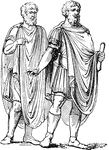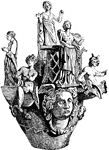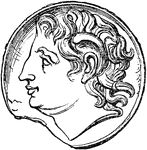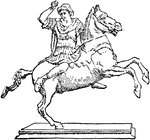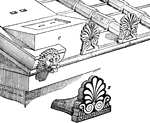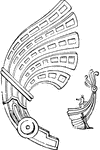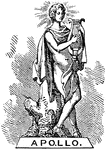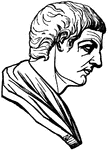
Accubation
"The act of lying or reclining; specifically, the ancient practice, derived from the Orient, of eating…
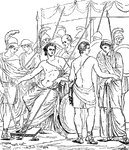
The Parting of Achilles and Briseis
"The Parting of Achilles and Briseis. (Supposed to be from a Greek Painting.)" —D'Anvers, 1895

Acontium
"a dart or javelin, smaller and lighter than the long spear, and thrown by means of a thong, or amentum"-Whitney,…
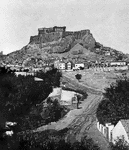
Acropolis
"The citadel of a Grecian city, usually the site of the original settlement, and situated on an eminence…
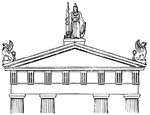
Acroteria
"Small pedestals placed on the apex or angle of a pediment for the support of a statue or other ornament."-Whitney,…
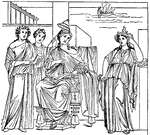
Dido parting with Aeneas
"Aeneas parted from Dido, though she tried every allurement and persuasion to detain him." —Bulfinch,…

Aeschines
"Aeschines owes the perpetuity of his fame to the fact he was the only rival of Demosthenes. He was…
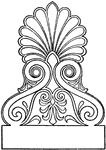
Greek Akroter
The Greek akroter serves as an ornamental finish to the apex of a gable. It is painted in the temple…
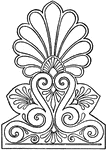
Greek Akroter
This Greek akroter is painted in Acropolis, Athens. It serves as the ornamental finish to the apex of…

Alcaeus
"Besides Sappho, her friend, perhaps lover, Alcaeus is almost the sole representative of the Aeolic…
!["The first noted public appearance of [Alcibiades] was on the occasion of the coming of the Lacedaemonian ambassadors requesting the surrender of Pylus. He at first violently opposed the petition, and even went so far as to urge the sending of an embassy to Argos to solicit that city to become a member in a new Athenian league. In spite of the earnest efforts of Nicias and of the protests of the Spartan ambassador, Alcibiades, by means of intrigue and bluster, succeeded in this work, and not only Argos, but also Elis and Mantinea, agreed to maintain an alliance with Athens for a hundred years."—Ridpath, 1885](https://etc.usf.edu/clipart/78900/78918/78918_alcibiades_mth.gif)
Alcibiades
"The first noted public appearance of [Alcibiades] was on the occasion of the coming of the Lacedaemonian…
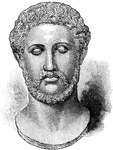
Alcibiades
A prominent Athenian statesman and member of the aristocratic family of the Alcmaeonidae.
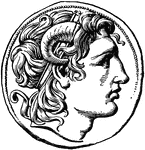
Coin of Alexander the Great
Alexander the Great's head on a silver coin of Lysimachus in 321-281 B.C.

Coin of Alexander the Great
"Coin of Alexander the Great. Alexander, at the time of his father's death, was in his twentieth year,…
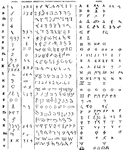
Alphabet of Antiquity
Leading alphabet of antiquity. Included is Punic (Western Semitic from Carthage, North Africa - now…
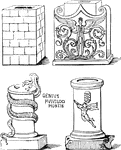
Altars
"Altars were either square or round. Specimens of both kinds are here given from ancient sculptures."…

Amphion and Zethus
"Amphion was the son of Jupiter and Antiope, queen of Thebes. With his twin brother, Zethus he was exposed…

Amphora
Amphoræ are jars with narrow necks and two handles, used by ancient Greeks for transporting oil…

Amphora
Amphoræ are jars with narrow necks and two handles, used by ancient Greeks for transporting oil…

Amphora
Amphoræ are jars with narrow necks and two handles, used by ancient Greeks for transporting oil…

Anacreon
"Though Anacreon has been famous as the poet of wine and love, few geniune fragments of his songs have…
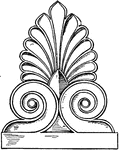
Greek Antefix
The Greek antefix is found in the lower roof line, in front of the imbrices (overlapping roof tiles).…
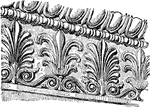
Anthemion-Molding
"A molding or frieze ornamented with a series of anthemia, usually in graceful alternation of two forms."-Whitney,…

Apollo and Hyacinthus
"Apollo was passionately fond of a youth named Hyacinthus. He accompanied him in his sports, carried…
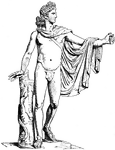
Apollo of the Belvedere - Front View of Statue
Illustration of the famous statue Apollo Belvedere. Created circa AD120-140, the statue depicts Apollo…

Tripod of Apollo
"It was the universal practice of the Greeks to undertake no matter of importance without first asking…

Apoxyomenos
An ancient sculpture representing an athlete using a strigil to scrape sweat and dust off his body.

Archaistic Statuette
"Archaistic Bronze Statuette from Verona, in the British Museum, in the imitation of Greek work, of…
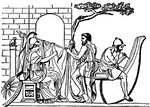
Building the Argo
"At that time the only species of navigation known to the Greeks consisted of small boats or canoes…
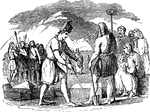
Founding of Argos
"Navigation for the purpose of commerce, and the art of writing, are said to have originated with the…
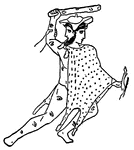
Argus
"Now Argus had a hundred eyes in his head, and never went to sleep with more than two at a time, so…

Aristophanes
A stature of Aristophanes, who was a prolific and commonly celebrated playwright of comedy. He is also…
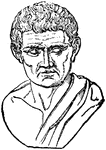
Aristotle
"Aristotle was born in 384 B.C., at Stagira, a seaport town of Chalcidice, whence he is frequeently…
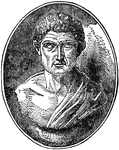
Aristotle
Aristotle was a Greek philosopher, a student of Plato and teacher of Alexander the Great. He wrote on…

Statue of Aristotle
Aristotle was a Greek philosopher, a student of Plato and teacher of Alexander the Great. He wrote on…
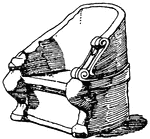
Greek Judge's Arm-Chair
The Greek judge's chair was made of marble and was found on the site of the Prytaneum, Athens.
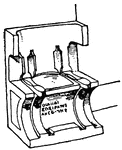
Greek Priest's Arm-Chair
The Greek Priest's chair was made out of marble and was found by the door of the temple of Themis, Athens.
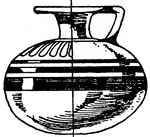
Greek Aryballos
This Greek Aryballos is a small spherical shape with a narrow neck. It is used as a perfume vase.

